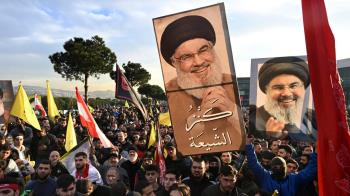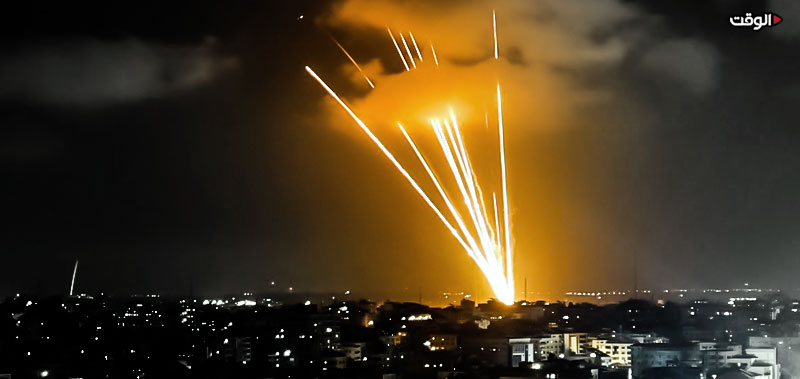Alwaght- The Israeli leaders thought that they have gained a big achievement by attacking Gaza and assassinating some of the resistance commanders and that they can unconditionally ink a ceasefire and bring back security to the occupied territories. But the course of developments and equations has not gone as Netanyahu and his orbit planned and mediation has run into a twist that in the upcoming days can make a lot of troubles for them.
Reports suggest that Palestinian resistance has rejected a ceasefire deal proposed by Egypt as the main regional mediator and is clinging to its demands and strict conditions that can complicate the situation and possibly prolong the war in a way that would fail the deterrence equation the Israelis were pursuing.
Al-Ghad news network of Egypt reported that an Israeli plane carrying a negotiation delegation landed in Cairo, but Israeli Army Radio in a Twitter message said that Egypt’s efforts have failed as the two sides failed to agree a truce. The talks were reported failed because of assassination of Ahmed Abu Agha, the member of Quds Brigades, the military wing of Islamic Jihad.
Still, Israeli officials said that Egypt has made a new proposal to Tel Aviv on Friday.
The Israeli Army Radio, citing an informed source, said: “Egypt’s peace proposal calls for a mutual ceasefire starting at midnight and does not include an Israeli commitment to stop the assassinations.”
Citing Israeli officials, Walla news of Israeli regime reported that the new Egyptian proposal was closer to the Israeli position regarding previous proposals and that the Israeli PM office “is reviewing it.”
Opposite to the statements of Israeli media and officials, the leaders of the Palestinian resistance insist on not accepting the ceasefire and continuing the attacks until the desired goals are reached in the negotiations. The Yedioth Ahronoth newspaper quoted a “senior source” as saying that “Israel wants the equation of peace for peace, and the Islamic Jihad movement has demanded the cessation of assassinations by Israel.”
“It is still too early to announce a position on the proposals presented by Egypt,” said Dawoud Shehab, a leader of Islamic Jihad, stressing that the movement will “stick to its positions” on forcing the occupation to stop the assassinations.”
Anwar Abu Taha, the head of Islamic Jihad media center, told Al-Arabi Al-Jadeed news website that the resistance will not quit its condition of halting the Israeli assassination of “our commanders and people” for any truce.
“In front of these cowardly and treacherous attacks that targeted the leaders of the resistance and their families, we tell the enemy leaders that the policy of peace for peace it sought has ended,” added Abu Taha.
He also in a message to the Israelis said that Quds Brigades still “can deal painful blows to the enemy.”
It seems that Islamic Jihad on the strength of Hamas support and the fear of prolonged war that the Israelis have is seeking to impose on the Israeli cabinet some written conditions including handover of body of deceased Palestinian prisoner Khader Adnan, cancellation of the scheduled Flags March, and halt of assassination of the resistance leaders. These conditions, if accepted by Netanyahu in a written way, can be considered a big defeat to the Netanyahu cabinet and bring more critical situation for him inside the cabinet and with the opposition.
Egyptian mediation, in the name of peace, in favor of the aggressor
In the new developments, the main reason why the resistance groups do not approve of the ceasefire is the way of regional mediation, especially that of Egypt that is leaning to the interests of the Israelis. After the assassination of Palestinian commanders and seeing a resolve for retaliation, the Israelis began to seek a ceasefire to block Islamic Jihad’s revenge and at the same time promote to the opposition parties the assassinations as a Netanyahu achievement. The Palestinians are also dissatisfied with the fact that in recent years Arab and international mediators, mainly the Egyptians, have never forced the Israelis to commit to terms of ceasefire deals. Actually, the Israelis have always used the negotiations as an emergency way to flee a security crisis and avoid making concessions.
This has been mentioned in the recent positions of the leaders of the Palestinian resistance, as Ehsan Ataya, a member of the political bureau of Islamic Jihad, said on Friday morning that “the mediators cannot provide guarantees due to the enemy’s non-compliance, and stopping the terror policy is a prerequisite for the ceasefire negotiations.”
From another aspect, there is a principle in all international conflicts that suggests if the aggressor seeks a ceasefire, it should pay the costs of its aggression. While the Gaza Strip is being administrated with extreme difficulty under siege and the Gazans are living in plight, occasional attacks by the Israelis impose further damages and costs on them.
Following the recent Israeli attacks, while UNRWA warned about deterioration of the situation in Gaza on the refugees especially Women and children, the Palestinian Businessmen Assassination said that each day of war costs Gaza $14 million.
Gaza officials talk about damage to infrastructure. At least 9 houses and 28 apartments were destroyed by the attacks. 532 others were damaged, they said, with 37 of them uninhabitable and 90 families lost their homes.
Officials have warned that the only power plant of Gaza will only have fuel for the next 72 hours if current conditions continue, and one of its three turbines has already been shut down.
In addition, the life of civilians has been disrupted. In addition to halt of educational activities, fishing is reportedly ceased for 4 days, leaving over 3,700 fishermen jobless. Also, over 600 tons of crops are grounded and cannot be exported, said Gaza officials.
Foiling Netanyahu’s plans
Nearly all of the analysts agree that the main driving force behind current tensions in Gaza is Netanyahu’s struggle to weather the home crisis. The hardliners in the Israeli cabinet thought that by assassinating its leaders, they can eliminate the Islamic Jihad as an influential force especially in the West Bank. They also thought that they can put pressure on Hamas and by making some concessions like relaxing the blockade and admitting more Gaza workers in the occupied territories, they can bribe it into staying silent to the controversial Flags March. But forming a joint operation command and disapproving of Tel Aviv-favored ceasefire shattered Netanyahu cabinet’s plans. Now the Israeli PM feels the danger of continuation of the clashes to the day of Falgs March.
It is highly important for Netanyahu and the hardliners and also for protection of the cohesion of the cabinet that amid home and foreign protests the march is held in its traditional way in the Bab Al-Amoud (Damascus Gate) and the nearby Muslim-majority neighborhood.
But this plan failed in the front of Hamas and Islamic Jihad unity. The resistance has proven that it is largely evolved in its strategy, capability, and military, manufacturing, and technical expertise. Now in the negotiations, the resistance has proven to Netanyahu that he cannot escape out of the internal crisis at the expense of the Palestinian blood. Given the ceasefire agreement reached last night and under which the Israelis committed to cessation of assassinations, it turns out that the Israeli regime has realized the heavy costs of assassination of resistance leaders and in the future, it cannot easily use this inhumane instrument against the Palestinians. Actually, this is one of the key achievements of the resistance in the recent conflict that severely affects the military equations between the resistance and Israeli regime.



























